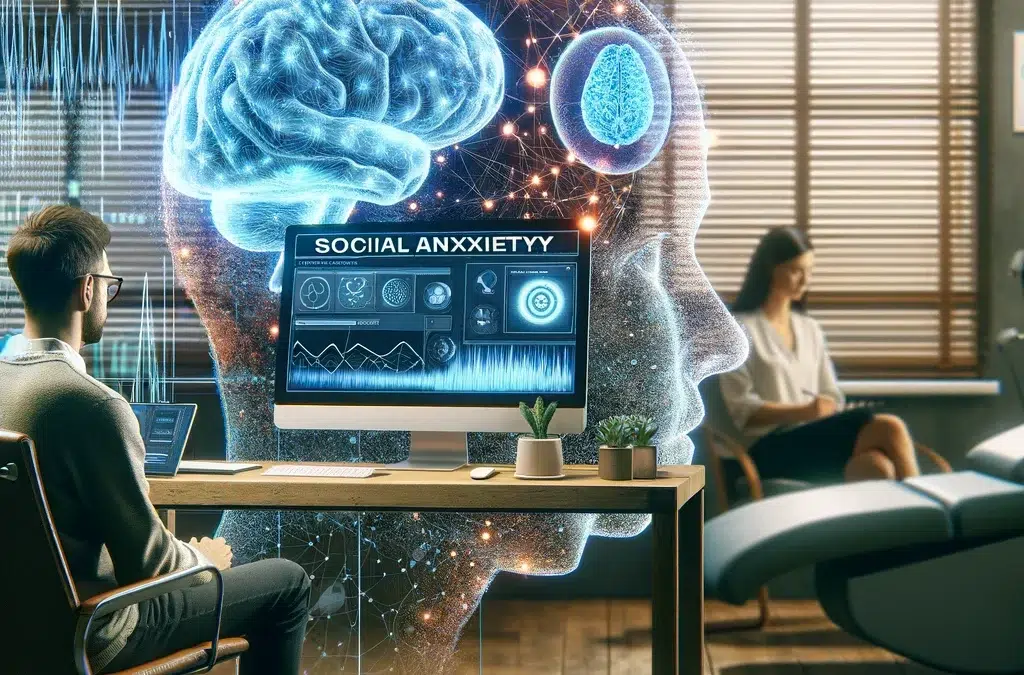Social Anxiety and Artificial Intelligence
As clinical psychologists, we know the complexities of social anxiety disorder (SAD). The fear of judgment, scrutiny, and potential humiliation creates a debilitating barrier for many individuals. While traditional therapies are effective, the integration of Artificial Intelligence (AI) offers exciting possibilities for both our own education and for enhancing the therapeutic process.
The intersection of social anxiety and artificial intelligence (AI) presents a fascinating paradigm shift in therapeutic approaches, offering clinical psychologists innovative tools to enhance their practice. As we delve into this synergy, it’s important to focus on practical applications that can be seamlessly integrated into both face-to-face and online sessions, without resorting to automatic assistance using chatbots or virtual reality technologies.
Understanding Social Anxiety Through AI
Social anxiety, characterized by intense fear or anxiety in social situations, can be debilitating for many. AI, with its analytical prowess, offers a unique perspective in understanding the multifaceted nature of social anxiety. Clinical psychologists can leverage AI-driven data analysis to uncover patterns and triggers that may not be immediately apparent through traditional methods. By incorporating AI tools in the assessment phase, clinicians can gain deeper insights into a patient’s anxiety, enhancing the precision of diagnosis and the personalization of treatment plans.
AI in Therapeutic Strategies
The use of AI can transcend the diagnostic phase, playing a crucial role in the development and implementation of therapeutic strategies. For example, AI can assist in the creation of tailored exposure therapy sessions, where stimuli are adjusted based on the individual’s response patterns. This allows for a more controlled, yet dynamic, approach to overcoming social anxiety, ensuring that the therapy is neither too overwhelming nor too lenient.
Moreover, AI can assist clinical psychologists in monitoring progress and predicting outcomes. By analyzing data collected during therapy sessions, AI algorithms can provide valuable feedback on the effectiveness of the treatment and suggest adjustments in real-time. This ongoing assessment aids clinicians in staying attuned to the patient’s evolving needs, fostering a more responsive and effective therapeutic environment.
Educational Advancements and Collaborative Learning
AI’s impact extends beyond the therapy room, offering significant benefits in the education and ongoing development of clinical psychologists. AI-driven platforms can facilitate advanced training modules, simulating a wide range of social anxiety scenarios. These tools allow clinicians to hone their skills in a risk-free environment, preparing them for the complexities of real-world cases.
Collaborative learning is another area where AI shines. Through AI-enhanced forums and knowledge hubs, clinical psychologists can share insights, discuss complex cases, and stay updated on the latest research and strategies. This collaborative approach, augmented by AI, fosters a community of learning and innovation, driving forward the collective understanding and treatment of social anxiety.
Ethical Considerations and Client-Centric Approaches
While embracing AI, it’s crucial to maintain a client-centric approach, ensuring that technology enhances, rather than replaces, the human element of therapy. Ethical considerations, including privacy, consent, and transparency, must be at the forefront when integrating AI into clinical practices. Clinical psychologists should use AI as a tool to augment their expertise, not as a substitute for their judgment and empathy.
Let’s explore how AI can empower us in tackling social anxiety head-on.
1. Deep Dives into the World of SAD:
– Research Powerhouse: AI can analyze vast amounts of research data, identifying underlying patterns and risk factors for SAD. This can inform our understanding of the disorder, leading to more personalized and effective treatment strategies.
– Tailored Treatment Plans: AI-powered algorithms can analyze patient data (with informed consent, of course!), suggesting evidence-based interventions specifically suited to their needs and anxieties. This personalized approach can accelerate progress and improve outcomes.
– Cultural Nuances: By analyzing large datasets of diverse populations, AI can help us navigate the cultural intricacies of SAD, ensuring culturally-sensitive and inclusive treatment approaches.
2. Enhancing Therapeutic Encounters:
– Social Skills Training: AI-driven simulations can provide safe, controlled spaces for patients to practice social interactions, gradually building their confidence and communication skills. This virtual practice reduces real-world anxiety and allows for targeted feedback.
– Emotion Recognition & Analysis: AI algorithms can analyze facial expressions, speech patterns, and physiological responses during sessions, providing real-time insights into patients’ emotional states. This can help us tailor our interventions in the moment and track progress more effectively.
– Anxiety Management Tools: AI-powered apps can offer patients personalized relaxation techniques, mindfulness exercises, and cognitive restructuring tools to manage anxiety triggers between sessions, empowering them to take charge of their recovery.
3. Continuous Learning for Clinicians:
– AI-powered Mentorship: Accessing the vast knowledge base of AI can provide personalized and targeted learning opportunities, keeping us updated on the latest research and treatment approaches for SAD. This continuous learning ensures we deliver the most effective therapy for our patients.
– Case Study Analysis: AI can analyze successful and unsuccessful treatment cases, drawing insights that inform our clinical decision-making and improve overall treatment effectiveness. This collaborative learning empowers us to be better therapists.
Conclusion
Incorporating AI into the treatment of social anxiety offers a wealth of opportunities for clinical psychologists. From enhanced diagnostic tools and tailored therapeutic strategies to advanced educational resources and collaborative platforms, AI can significantly augment the therapeutic process. However, it’s essential to approach this integration with a balance of enthusiasm and caution, ensuring that AI serves as a complement to, rather than a replacement for, the nuanced and empathetic care provided by clinicians.
As we continue to explore the potential of AI in addressing social anxiety, the focus should remain on leveraging technology to enhance the quality of care, improve treatment outcomes, and foster a deeper understanding of this complex condition. In doing so, clinical psychologists can unlock new possibilities in therapy and offer their patients a path to a more confident and anxiety-free life.
Disclaimer: AI does not replace professional training and specialization.
Reference:
https://www.mtu.edu/well-being/resource-tools/aitherapyforanxiety/

